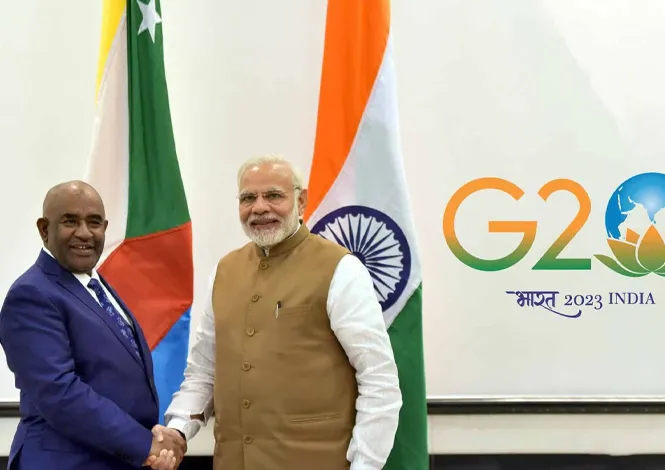-
CENTRES
Progammes & Centres
Location
AU’s G20 membership offers much to the continent, but whether it will lead to tangible results will depend on its ability to forge partnerships with other countries of the Global South

The induction of the African Union (AU) as a permanent member of the G20 was the hallmark of India’s G20 presidency. As a continent which has historically been marginalised in global governance conversations, being inducted into the G20 as a full member is a welcome development. On the other hand, AU’s entry has also transformed the G20 from an elite club to a more inclusive platform and improved the legitimacy of the grouping which can now be a more effective instrument of multilateralism. Most African leaders like Moussa Faki Mahamat, Chairperson of the AU Commission, feel AU’s entry into the G20 will enable advocacy in favour of Africa and also help Africa make positive contributions to global challenges like climate change.
AU’s inclusion in the G20 would remain a symbolic gesture unless it can defend African interests, present its own narrative, and use the platform to realise the continent’s strategic masterplan for development, the Agenda 2063.
However, will a seat at the high table automatically ensure a change in Africa’s status from a passive receiver to a shaper of global decisions? Will Africa be immediately seen as an equal partner by all the powerful countries in the G20, a platform which has so far taken crucial decisions such as the Debt Services Suspension Initiative (DSSI) and the Common Framework (initiatives which favoured creditor nations at the expense of African countries) without any inputs from African countries? The answer is no. Therefore, after the initial phase of excitement and celebration has passed, it is now time to reflect on how Africa can turn the corner on marginalisation in global affairs through the AU’s effective membership at the G20. AU’s inclusion in the G20 would remain a symbolic gesture unless it can defend African interests, present its own narrative, and use the platform to realise the continent’s strategic masterplan for development, the Agenda 2063. However, there are several roadblocks ahead for the AU.
While the AU has been granted the same status as the European Union (EU), there are notable differences in the structure of the two institutions which complicates matters. For instance, unlike the EU, the AU is not a supranational organisation and African regional cooperation at the monetary level is poor. Therefore, unlike the EU member states, the AU member states cede less power to the AU and ensuring proper representation at the technical working groups and meetings of the central bank governors and finance ministers will be fraught with challenges. The first challenge concerns representation. Two immediate questions before the AU are who should represent the AU at the finance ministers and central bank governors meeting and how to ensure proper engagement in the Sherpa track. According to policy analyst Ivory Kairo, the AU Commission’s Commissioner for Trade and Industry and the Finance Minister from the AU Chair should represent the AU at the Finance Minister’s level and the AU Chair or the head of the African Development Bank or the Afrexim Bank should represent the AU at the central bank governors meeting. On the other hand, experts like Ibrahim Mayaki, the African Union Special Envoy for Food Systems, and Dauda Semebene, Managing Partner of AfriCatalyst, call for the appointment of a special envoy who will accompany the AU Chair Finance Minister and Central Bank governor.
Two immediate questions before the AU are who should represent the AU at the finance ministers and central bank governors meeting and how to ensure proper engagement in the Sherpa track.
Given that the African Development Bank is not an autonomous institution as some of the powerful G20 member states like the United Kingdom (UK), Japan, and the United States (US) are its largest shareholders, the Afrexim Bank head may be more appropriate for representing the AU at the G20. Also, given that, unlike the EU president, the AU Chair has to govern his own country, Mayaki and Semebene’s suggestion of special envoys seems more suitable.
Regarding the appointment of Sherpa, Kairo’s suggestion of the AU Commission’s commissioner for trade and industry plus the foreign minister/diplomatic adviser of the AU chair or a special envoy appointed by the AU Commission Chairperson is appropriate. For effective partnership in the Sherpa track, the AU should fully leverage its existing departments such as Agriculture, Rural Development, Blue Economy, and Sustainable Environment (ARBE) Economic Development, Tourism, Trade, Industry, Mining (ETTIM) Infrastructure and Energy, and Education, Science, Technology & Innovation (ESTI).
Secondly, the AU will very likely struggle to develop common positions on major issues as there is no mechanism to develop common positions within the AU as of now. According to experts like Pamla Gopaul, African countries’ diverse colonial and historical alliances could worsen the situation. Thus, the AU needs to develop a carefully crafted strategy to develop common positions on major issues to ensure that it can reap the potential benefits of a seat at the high table.
Thirdly, maintaining continuity in negotiating positions will also prove to be a major challenge for the AU because the AU chair rotates every year, unlike the president of the EU Council whose term lasts two and half years. Moreover, as mentioned earlier, the AU Chair must also govern his/her own country. For many of the smaller African countries which do not have effective bureaucracies to handle the twin pressures, this will prove to be onerous.
Given India’s commitment to the Global South and its time-honoured partnership with Africa, India and the AU should step up cooperation in areas of common interest such as reform of the international financial architecture, climate change, food security, and education and skilling.
Lastly, the AU chair currently also lacks the institutional support to contribute effectively as a full member. It is here that AU’s effectiveness in forging partnerships with other G20 countries, particularly from the Global South, like India, will come into play. To exert its influence within the G20 and make the most of its G20 membership, the AU should seek to partner with countries of the Global South. Given India’s commitment to the Global South and its time-honoured partnership with Africa, India and the AU should step up cooperation in areas of common interest such as reform of the international financial architecture, climate change, food security, and education and skilling.
In a nutshell, AU’s membership offers much to the continent, but whether it will lead to tangible results will depend on the institution’s ability to address the challenges it faces currently and its ability to forge partnerships with other countries of the Global South including India. Is the AU up for the task? Only time will tell.
Malancha Chakrabarty is Senior Fellow and Deputy Director (Research) at the Observer Research Foundation
The views expressed above belong to the author(s). ORF research and analyses now available on Telegram! Click here to access our curated content — blogs, longforms and interviews.

Dr Malancha Chakrabarty is Senior Fellow and Deputy Director (Research) at the Observer Research Foundation where she coordinates the research centre Centre for New Economic ...
Read More +